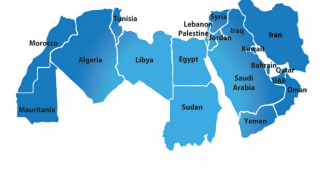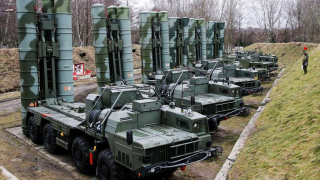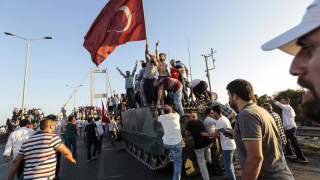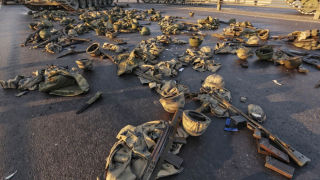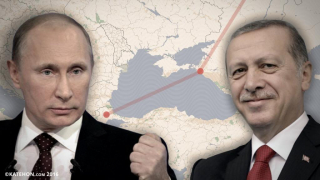EVALUATIONS AND RECOMMENDATIONS IN REGARDS TO TURKISH-RUSSIAN RELATIONS
We learned the story of honey badger (mellivora capensis) and honey guide bird (indicator conirostris) while touring the Darwin Museum in Moscow, the other day. The honey guide bird is nourished by the honey bee larvae; however, it cannot approach the bee hive because of the bees. Upon finding the bee hive, it immediately searches for a honey badger and directs it towards the bee hive by chirping and hovering around it. The honey badger which is hungry but is resilient towards the bees, spreads the bee hive, eats the honey it contains and of course sets aside a share for the honey guide bird, its collaborator. The honey guide bird then, feasts over the honeycomb worm.
There is literally a natural “alliance” between these two animals. They need each other; without the other, neither one can get nourished or stay alive. There is an interdependence between the two. Only by acting together can they overcome their struggle with nature.
THE BRONZE-LAW OF TURKISH-RUSSIAN RELATIONS
Independent of which one is the honey badger and which one is the honey guide bird, the relationship between Turkey and Russia is exactly like this. As it is the foundation to this thesis of ours, let us start with the bronze law of the history of the relations between the two countries.
Throughout history, there has not been a winner among the sides of the Turkish-Russian war/conflict/tension, from the Ottoman-Tsarist Russia to the Republic-Soviet age, from the cold war era to our day. In other words, both sides are the losers of this conflict. The only winner has been the expansionist/Imperialist powers of the West. Even the regional plans of the West have continuously relied on Turkish-Russian conflict. The wars between the two countries, or the conflicts provoked from the outside, have on one hand prevented the possible alliance between Turkey and Russia, which would have certainly avoided a foreign power’s interference to the region; and on the other hand, it granted the West the opportunity to achieve their desired plans in the region because the two countries fell weak due to fighting against each other and collecting their attention towards each other.
Of course, an equilibrium in complete contrast of this bronze law is also in question. From the past to our present day, Turkish-Russian cooperation has played a historic role in realizing the two countries’ own interests, and also brought peace and stability to the region by blocking the West's plans. While the two sides benefited from this situation, the loser has been the West.
 RELATIONS OF THE ‘DARDANELLES RESISTANCE, OCTOBER REVOLUTION AND THE TURKISHWAR OF INDEPENDENCE’
RELATIONS OF THE ‘DARDANELLES RESISTANCE, OCTOBER REVOLUTION AND THE TURKISHWAR OF INDEPENDENCE’
To give a striking example; the process during and after the First World War is instructive. The bloodiest battles of the war took place on the Turkish-Russian Caucasian Front. For the sovereignty of the region, Mehmetçiks and Ivans shed their blood and civilian casualties were added to top it off. But, at the end of the war, South Caucasus remained neither to Russia nor to Turkey. The British, French, partly Americans and their collaborative governments settled in the region.
Mustafa Kemal and Lenin will reverse the process. Turkey’s resistance in the Dardanelles during the First World War has prevented the Imperialist Allies’ rush to aid the Tsarist Russia and had given birth to the conditions of the October 1917 Revolution. Thus, Tsarist Russia, one of the large states to enter the war to share Turkish lands was demolished and was replaced by Soviet Russia which supported the Turkish War of Independence in Anatolia. This situation created the international conditions for the success of the Turkish War of Independence. The South Caucasus leg of the equation of the ‘Dardanelles Resistance–October 1917 Bolshevik Revolution–Turkish War of Independence’ was formed by the cooperation of the Turkish and the Red Armies. The operations carried out by the Turkish Armies from the south and the 11th Red Army from the north, as a result of the cooperation of the Ankara and Soviet governments, put an end to the dominance of the West and their collaborative governments; thus it enabled the two revolutions to survive, brought peace and prosperity to the region, started the era of socialist revolutions and nationalist wars of liberation by bringing results that transcended the borders of the region. The two countries had broken the occupation and siege of the West by fighting shoulder to shoulder. The two countries had no other option but to cooperate. There was natural alliance between Ankara and Moscow.
PARALLELS DURING COMMUNAL DEVELOPMENT PERIODS
This common fate between the two countries is also seen in the historical past of their communal development and progress periods. Historically, Turks and Russians have faced similar problems, produced similar solutions to these problems and given similar reactions. Following examples can be given for the parallels in their communal development processes:
· Reform actions experienced in the two countries during 19thcentury.
· Enlightened and aristocrat type of people, who have become alienated to their own heritage as a result of crooked Westernization
· Similarities and interactions in the revolutionary activities
· The 1905 Revolution in Russia – The 1908 Young Turk Revolution
· The 1917 October Revolution – The 1920 Kemalist Revolution
· Adoption of the NEP (New Economic Policy), which allowed capitalist relations under state control in the Soviet Union in 1921 – Adoption of relatively more liberal policies at the Izmir Economic Congress (February-March 1923)
· Transition to collectivism in the USSR in 1928 – State-control policies starting to be implemented in Turkey in the early 1930's
· Adoption of planned development models in both countries in the same period
• Revisionism that arose in the USSR from the second half of the 1950’s onwards – In Turkey, reversal from the Kemalist Revolution, particularly in the 1950’s
• Retreating from socialism resulted with the breakup of the USSR in the beginning of 1990’s, and also Russia kneeled in front of globalization – With the destruction of Kemalist Revolution, Turkey surrendered to the New World order from 12th September 1980 onwards, and also, the national state came face to face with the threat of demolition
• By Putin’s coming to power, Russia’s standing up on its own feet again in the beginning of 2000's – Turkey's reactions against the West’s threats in recent times
THE PLATFORM TO SIT AT EQUAL LEVELS AROUND THE TABLE
Today as well, depending on the parallels in communal developments, Turkey and Russia are going through a process similar to the one at the beginning of the 20th century. Both countries are under the siege of the West, their national security faces serious threats and there are attempts to drown their economies. Therefore, similar to the beginning of the 20th century, a natural alliance is in question. They are both in need of each other as much as the honey badger and the honey guide bird.
This obligation, which is valid for both parties, enables the development of relations on a healthy basis within the frame of mutual interests of partners that have equal weight.
As much as Turkey needs Russia, Russia needs Turkey. Both parties will be able to sit at the table on equal level.
As natural allies, Turkey and Russia's current and potential cooperation fields and the steps that should be taken at these points could be approached under the following headings:
IDLIB AND EAST OF THE EUPHRATES RIVER ARE THE SAME FRONT LINE
Syria: The only principle in the solution of the Syrian problem is the territorial integrity of Syria. Syria’s territorial integrity is Turkey’s territorial integrity. Any area that would disrupt Syria’s territorial integrity would be a springboard for the United States against Russia.
In this respect, the military and political duty loaded on their governments by the objective interests of the two countries is quite clear: the liquidation of every element that disrupts the territorial integrity of Syria. Today, it is clear who these elements are: the fanatical terrorist groups such as the HTŞ (Heyet Tahrir el Şam–previously El Nusra) based in Idlib, and the separatist terror groups settled in the east of the Euphrates River. Both are backed by the US and they are both cooperating with each other.
Hence, from the point of view of Turkey and Russia, Idlib and the east of Euphrates River should be handled as a single front. The presence of one is feeding the other. If we were to express in reciprocal terms, the collapse of one is the prerequisite for the collapse of the other. Turkey and Russia, cannot have the liberty to favor any one of them. Cleaning some cancerous cells and leaving others will not cure the disease. In fact, it even creates the danger of the disease to spread to other places in the future.
Therefore, liquidation of the terrorist groups in Idlib, is in the interests of Turkey, much more than that of Russia’s and at least as much as that of Syria's.
Due to laying down of arms by the other groups in Idlib, and by Damascus' declaration of amnesty in return to this, these groups and HTŞ could be separated from each other; and after that, the terror groups should be completely eradicated with the cooperation of Turkey-Russia-Iran-Syria.
In parallel, these four countries would also act jointly in the elimination of separatist terror centers (PKK/PYD/YPG) located on the east of the Euphrates.
The situation here is not mutual concessions given by Turkey and Russia. Idlib and the east of the Euphrates is a single front, the terror centers located in these places are against the interests of both countries, their elimination is in the interests of both countries.
The interests are common, the solution is simple, details and timing can be discussed. The issue is urgent, gaining strength of the fanatical and separatist terror groups and sabotaging of Turkish-Russian relations by America should not be allowed.
EASTERN MEDITERRANEAN AND THE BLACK SEA ARE THE SAME FRONT LINE
Eastern Mediterranean–Black Sea:In the strategy of the USA to siege Turkey and Russia, Eastern Mediterranean and the Black Sea are inseparable. On the other hand, the special situation of Turkey and Russia, necessitates handling together of the geopolitically important two other regions (Cyprus and Crimea issues) in the Turkey-Russia relations.
In the Eastern Mediterranean, a block is formed by US-Israel-Greece-Southern Cyprus. It is obvious that Turkey is targeted by the exercises held by this block and the experienced gas exploration crisis. However, this block is not only threatening Turkey, but Russia as well. While the US is encircling Turkey from the Eastern Mediterranean, it is encircling Russia too. While Washington has lifted its arms embargo on Southern Cyprus, it has provoked the Greek Cypriot administration against Moscow too, as reflected in the press. Increasing the number of warplanes on British bases in the Greek part of Cyprus threatens the Russian presence too in the region. If evaluated as a whole, the US which has dominated the Eastern Mediterranean, finds the opportunity to enter the Black Sea more easily. It should also be remembered that the security of the Eastern Mediterranean is the guarantee of the final solution of the Syrian problem.
The same applies to the Black Sea as well. The US efforts to enter the Black Sea is not only a part of the Russian siege strategy, but has a role in the containment plan of Turkey too.
Therefore, the two countries have common interests against the US siege strategy from the Eastern Mediterranean and the Black Sea; so, they need to act jointly in breaking this siege. This cooperation can find its base on the Cyprus and Crimean issues. Turkey can take steps on the subject of Crimea in response to the steps that Russia will take on the subject of Northern Cyprus. These reciprocal steps are essential for the security of the Eastern Mediterranean and the Black Sea.
On the other hand, Russia’s dream “to reach warm waters” can become a reality not by fighting with Turkey but only by cooperating with Ankara, as learned from history.
Putin’s invitation of Erdogan to the opening ceremony of a mosque in Crimea, may be a beginning. In return, the Turkish Republic of Northern Cyprus may accept a Russian delegation. The opportunities that Crimea can offer for Turkish businessmen and the doors that the Turkish Republic of Northern Cyprus can open to the Russian business community are also worth gold under the economic crisis conditions.
ASTANA MODEL TO THE KARABAGH PROBLEM
Southern Caucasia:The largest US embassy in Europe is in Armenia. As a result, a very serious American domain and agent network has been established in Armenia. This network played an important role in Pashinyan’s coming to power. Russia is quite uncomfortable with Pashinyan government’s pro-Western policies.
This situation offers significant options in favor of Turkey and Azerbaijan in the redefining of the power balances and alliances in the Southern Caucasus. We’re already seeing its signs from the Kremlin.
Everyone sees that the Minsk Group cannot offer a solution to the Karabagh issue. The success of the Astana process on Syria, is an example for resolving conflicts in the region, especially the Karabagh issue. Turkey, Russia and Iran are much more concerned with the resolution of the Karabagh issue in comparison to the Western countries, from point of view of geography, geo-politics and history. There is an objective basis for the operation of the Astana process on the Karabagh conflict and on the South Caucasus issues. Turkish-Russian cooperation will nullify the US plans in the South Caucasus and as pointed out above, will bring fair peace to the region as in history.
TURAN IN COOPERATION WITH RUSSIA
Central Asia: The control of Central Asian energy resources and roads, i.e. the “heartland” is the strategic goal of the United States. The US plans in the Middle East, the Eastern Mediterranean, the Black Sea, the Caucasus and Eastern Europe are the preliminary steps of this main goal. Turkish-Russian and of course China’s cooperation is necessity in Central Asia too.
Turkey’s attempts to enter the region within the framework of US projects since the beginning of 1990's, has resulted in disappointment. And today, because some of the countries in those regions have turned into a FETÖ base, those initiatives came back as a threat against Turkey.
Just as Russia has no chance to “reach warm waters” by clashing with Turkey, Turkey has no chance to establish a “Turan” with animosity towards China and Russia. However, Turkish-Russian-Chinese cooperation may be an important tool of Turkey’s integration with the Turkish civilizations and peoples in Central Asia.
WEAPON TECHNOLOGY–INDEPENDENT OF NATO
Defense and Weapons Systems: In spite of being a de facto member of NATO, Turkey is faced with NATO threat, especially in Syria and Eastern Mediterranean. In case of a possible conflict, there is no chance of Turkey using weapons and defense systems dependent on NATO. Therefore, Turkey needs to diversify its defense armament in order to balance the threat coming from the USA.
Purchase of the S-400’s is the first important step of this. It needs to be admitted that this is not only because the S-400’s are the best example of such weapons, but because this is a strategic choice. Turkey is resisting the threat coming from the West, by positioning itself in Eurasia.
Further deepening of cooperation in the arms and defense industries, seems inevitable in the coming period. Of course, the ultimate goal should be to produce these systems in Turkey itself. However, cooperation with Russia supports this objective too. Joint production of many weapons and defense systems and technology transfer takes place in the cooperation agenda of the two countries.
Supply of ammunition and weapons from Soviet Russia during Ataturk’s War of Independence and in the early years of the Republic, was the historical basis of this cooperation.

POLITICAL WILLPOWER AND THE NEED FOR ACCUMULATION
Turkish-Russian strategic alliance has a solid foundation because it depends on necessities. Obligations determine the strategies of the states. It is impossible for these two countries that have solid-state traditions to ignore these obligations. But time is short, there is no luxury to waste time. Beyond the relations between the two countries, the issue is directly related to the survival problem of the country. Pragmatic steps should be replaced by more serious, long term and consistent strategic plans. Turkey may take initiatives in the areas of cooperation mentioned above, and can guide the process. The need is mobilization of the political will and the deposition to manage this process and removal of the obstacles fronting this tendency.
Turkish-Russian collaboration at the beginning of the 20th century opened the era of socialist revolutions and national liberationwars. The two countries shed blood and sweat ‘not only in their own name and account but in the name of the world of all the oppressed.’ The strategic cooperation of the two countries will today unveil the era of Euroasia and will again bring hope to the world of all those oppressed.


